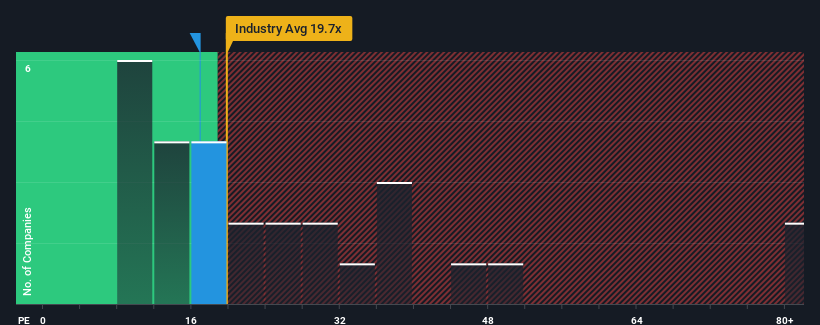Earnings Not Telling The Story For Tsumura & Co. (TSE:4540) After Shares Rise 39%

Tsumura & Co. (TSE:4540) shareholders have had their patience rewarded with a 39% share price jump in the last month. The last 30 days bring the annual gain to a very sharp 39%.
After such a large jump in price, Tsumura's price-to-earnings (or "P/E") ratio of 16.9x might make it look like a sell right now compared to the market in Japan, where around half of the companies have P/E ratios below 14x and even P/E's below 9x are quite common. Nonetheless, we'd need to dig a little deeper to determine if there is a rational basis for the elevated P/E.
While the market has experienced earnings growth lately, Tsumura's earnings have gone into reverse gear, which is not great. It might be that many expect the dour earnings performance to recover substantially, which has kept the P/E from collapsing. You'd really hope so, otherwise you're paying a pretty hefty price for no particular reason.
View our latest analysis for Tsumura

What Are Growth Metrics Telling Us About The High P/E?
Tsumura's P/E ratio would be typical for a company that's expected to deliver solid growth, and importantly, perform better than the market.
Taking a look back first, the company's earnings per share growth last year wasn't something to get excited about as it posted a disappointing decline of 13%. This has soured the latest three-year period, which nevertheless managed to deliver a decent 9.4% overall rise in EPS. Although it's been a bumpy ride, it's still fair to say the earnings growth recently has been mostly respectable for the company.
Looking ahead now, EPS is anticipated to climb by 0.6% each year during the coming three years according to the three analysts following the company. That's shaping up to be materially lower than the 10% per annum growth forecast for the broader market.
With this information, we find it concerning that Tsumura is trading at a P/E higher than the market. Apparently many investors in the company are way more bullish than analysts indicate and aren't willing to let go of their stock at any price. Only the boldest would assume these prices are sustainable as this level of earnings growth is likely to weigh heavily on the share price eventually.
The Key Takeaway
Tsumura shares have received a push in the right direction, but its P/E is elevated too. We'd say the price-to-earnings ratio's power isn't primarily as a valuation instrument but rather to gauge current investor sentiment and future expectations.
Our examination of Tsumura's analyst forecasts revealed that its inferior earnings outlook isn't impacting its high P/E anywhere near as much as we would have predicted. Right now we are increasingly uncomfortable with the high P/E as the predicted future earnings aren't likely to support such positive sentiment for long. Unless these conditions improve markedly, it's very challenging to accept these prices as being reasonable.
Before you take the next step, you should know about the 2 warning signs for Tsumura that we have uncovered.
You might be able to find a better investment than Tsumura. If you want a selection of possible candidates, check out this free list of interesting companies that trade on a low P/E (but have proven they can grow earnings).
Valuation is complex, but we're here to simplify it.
Discover if Tsumura might be undervalued or overvalued with our detailed analysis, featuring fair value estimates, potential risks, dividends, insider trades, and its financial condition.
Access Free AnalysisHave feedback on this article? Concerned about the content? Get in touch with us directly. Alternatively, email editorial-team (at) simplywallst.com.
This article by Simply Wall St is general in nature. We provide commentary based on historical data and analyst forecasts only using an unbiased methodology and our articles are not intended to be financial advice. It does not constitute a recommendation to buy or sell any stock, and does not take account of your objectives, or your financial situation. We aim to bring you long-term focused analysis driven by fundamental data. Note that our analysis may not factor in the latest price-sensitive company announcements or qualitative material. Simply Wall St has no position in any stocks mentioned.
About TSE:4540
Tsumura
Manufactures and sells pharmaceutical products from crude drugs derived from plants and other natural products in Japan and internationally.
Very undervalued with solid track record and pays a dividend.
Market Insights
Community Narratives



